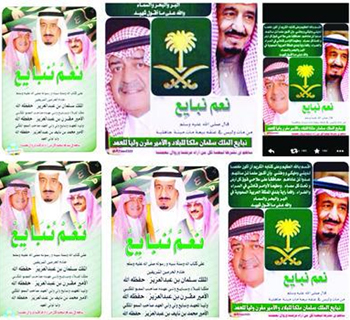
Jeddah, Jan 28: A member of the Council of Senior Scholars said pledging allegiance to Custodian of the Two Holy Mosques King Salman through social networking websites is allowed, especially since the monarch is the first Saudi king to have a Twitter account.
Sheikh Abdullah Al-Manie, a member of the council, said that any citizen can use social media to pledge allegiance to King Salman, stressing the importance of this gesture in Islam, local media reported.
Social networking websites during the past two days have remained an active platform used by Saudi citizens to offer condolences to the royal family on the passing away of King Abdullah and pledge allegiance to the country’s new leadership.
“On Twitter, there are more than one million tweets pledging allegiance to King Salman, while there were over a million messages during the past three days on the same site condoling the death of King Abdullah,” Saeed Jadallah, a social network expert told Arab News.
A flurry of activities on the social media during the past few days have reflected Saudis’ interest in the latest developments and their desire to pledge their allegiance and support to the new leadership. “The Kingdom has more than two million Twitter users, which is the highest number in the Arab world, making up 45 percent of all Twitter users in the Arab countries,” Jadallah added.
“Furthermore, many Saudis found pledging allegiance to King Salman through their accounts on Twitter and others social websites easier than going to their respective governorates,” he said.





Comments
Add new comment